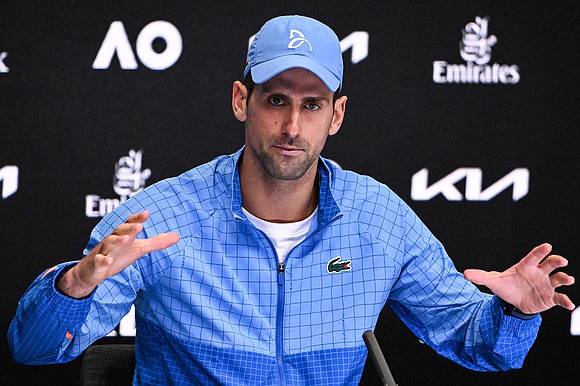Novak Djokovic says his father had 'no intention whatsoever to support any kind of war initiatives'
CNN/Stylemagazine.com Newswire | 1/27/2023, 1:25 p.m.

Originally Published: 27 JAN 23 11:56 ET
By Jill Martin and George Ramsay, CNN
(CNN) -- Novak Djokovic said his father, Srdjan, had "no intention" of supporting any kind of "war initiatives" after being filmed with a group of Russian supporters at the Australian Open.
Djokovic reached his 10th Australian Open final on Friday after defeating American Tommy Paul in straight sets. Ahead of the match, tournament organizers said they had "briefed and reminded" players and their entourages about the tournament's "policy regarding flags and symbols."
On Wednesday, video emerged of Djokovic's father with a group of supporters holding the Russian flag and displaying the "Z" symbol, which is viewed as a sign of support for Russia and its invasion of Ukraine.
The symbol has been seen on Russian equipment and clothing in Ukraine.
Srdjan Djokovic said he would not be in the stands to watch his son's semifinal, adding that he was in Melbourne "to support my son only" and "had no intention of causing such headlines or disruption."
After his victory against Paul on Friday, Djokovic said: "My father, my whole family, and myself, have been through several wars during the '90s.
"As my father put in a statement, we are against the war, we never will support any violence or any war. We know how devastating that is for the family, for people in any country that is going through the war."
As a child growing up in Belgrade, Djokovic lived through NATO's 78-day bombing campaign in 1999, which was intended to end atrocities committed by troops of Yugoslavia's then-president Slobodan Milošević against ethnic Albanians in the province of Kosovo.
Djokovic added that his father, as has been the case throughout the Australian Open, had gone to meet with fans, many of whom were displaying Serbian flags, to thank them for their support after his Australian Open quarterfinal.
"The photo that he made, he was passing through," said Djokovic. "I heard what he said in the video. He said, 'Cheers.' Unfortunately, some of the media has interpreted that in a really wrong way.
"I'm sorry that that has escalated so much. But I hope people understand that there was absolutely no intention whatsoever to support any kind of war initiatives or anything like that.
"My father ... He thought he was making a photo with somebody from Serbia. That's it. He moved on."
Asked if his father would be back in the stadium for Sunday's final against Stefanos Tsitsipas, Djokovic said he would wait and see.
"Of course, it wasn't, again, pleasant not to have him in the box [on Friday]," he said. "It's a decision that we made together. Just didn't know how things will play out, I guess.
"I hope to have him. I hope he's going to be feeling okay to be in the courts because I would like to have him there for the finals."
The presence of Russian flags and symbols at the Australian Open has been a source of controversy throughout the tournament.
In the first week, organizers banned spectators from displaying Russian and Belarusian flags, and on Wednesday, they said four people had been ejected from Melbourne Park for displaying pro-war imagery.
Several Ukrainians, including current player Marta Kostyuk and former player Alexandr Dolgopolov, have spoken out against the presence of Russian flags and "Z" symbols at the tournament.
On the court, Djokovic has been in superb form over the past two weeks and is the strong favorite to defeat Tsitsipas in the men's singles final.
If he does, he would win his 10th Australian Open title and 22nd grand slam crown, tying him with Rafael Nadal at the top of the men's all-time list.



